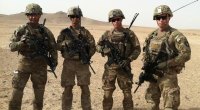In 2015, Erik Bartell spent five months in Afghanistan with the 101st Airborne. Bartell, then 24 years old, had the task of leading a platoon of 30 soldiers who "should serve as the theater or as security and support for the teams of the Special Forces".
Being in a high stress environment thousands of miles from home has been known to put a strain on everyone, including well-trained soldiers, both physically and mentally. Bartell, however, was in a unique position to stand firm despite the adversity after a tumultuous upbringing in Chicago.
Erik Bartell was raised by a single mother in north Windy City. “We were homeless for about three years when we were growing up,” he says. “We were housed in shelters for the homeless. So the family dynamic wasn't that great. "
Youth sport became a welcome distraction that helped him develop an impressive thirst for success. “My goal was to be the toughest worker on the field or pitch, even if I wasn't the most talented,” he says.
This tireless work ethic impressed his coaches and headmaster. So much so that they pulled the strings to raise his profile with a highly competitive selective enrollment facility in town.
"My entrance exam results alone weren't enough to get into Lane Tech College Prep High School," admits Bartell. “But I got good grades and with their help I was accepted. It was a turning point. "
Life at home remained tense. To keep his feet on the ground, he continued to prioritize athletics. “I wrestled, played basketball, played soccer - whatever I could. Participating in a sport was the difference between coming home at 3 p.m. or 7pm, ”he says. For the next four years, however, he also prioritized his academic performance.
It paid off in the form of a high scholarship to DePaul University in Chicago, and he was the first in his family to go to college.
College life, however, was not what he expected. Many other students, it seemed, were more interested in parties than in their studies. “I felt like I didn't fit in, as if my values and beliefs were just different,” he says.
Courtesy Erik Bartell
He considered quitting the police, but he was below the minimum age. “So second best, I thought, was the army,” he adds.
His mother stepped in and gave up her foot and insisted that he finish college. That summer, Bartell attended basic training. Upon returning to school, he was accepted into DePaul's Reserve Officer Training Corps (ROTC) program.
“Everyone in there was like-minded and super motivated when it comes to fitness and team. I knew this was my tribe, ”he explains.
After graduating with a degree in Psychology in 2013, Bartell signed up for service at Fort Benning, Georgia for infantry training. A year later he was called to Fort Campbell to join the 101st. Then came his mission. After returning home, he spent another year on his platoon before a meniscus tear presented him with a choice: drop out of the infantry or retire from service. He chose the latter.
Erik Bartell relied on social media to keep in touch with the military community. “I had about 30 people in my unit who followed me looking for workouts,” he explains. "Then 30 became 60 and then hundreds."
 Courtesy Erik Bartell
Courtesy Erik Bartell
w @realerikbartell has over 150,000 followers. Bartell's growing social reach and robust network of military veterans led him to the nonprofit FitOps Foundation, which helps veterans find careers in the fitness field. He received an apprenticeship certification and joined their team to train other veterinarians. This led to a consulting activity with the sports nutrition company Performix and later to an important contribution to getting DekaFit from Spartan Race - the Decathlon of functional fitness - on the way.
Most recently, Erik Bartell became a founding member and Vice President of Community for the startup Bravo Sierra, a men's grooming company that dedicates five percent of its sales to the military. As part of his job, it is overseeing the strategy and growth of the company's social media platforms. To do this, he focuses, unsurprisingly, on helping others gain recognition in the industry.
"I know a lot of trainers or influencers who say that, but not all of them mean it: My goal in fitness is to help as many people as possible," he says. “Fitness is my passion. So the biggest thing I can do to feel successful in the fitness world is to help more people. "


